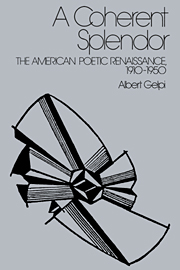Book contents
- Frontmatter
- Contents
- Acknowledgments
- Dedication
- Introduction. The Janus-Face of Romanticism and Modernism
- 1 Robert Frost and John Crowe Ransom: Diptych of Ironists, the Woodsman and the Chevalier
- 2 Wallace Stevens: World as Mundo, Mundo as World
- 3 T. S. Eliot: The Lady Between the Yew Trees
- 4 Ezra Pound: Between Kung and Elcusis
- 5 H. D.: Helen in Bethlehem, Hilda in Egypt
- 6 William Carlos Williams: Mother-Son and Paterson
- 7 Allen Tate and Hart Crane: Diptych with Angels and Demons
- Coda. Yvor Winters and Robinson Jeffers: The Janus-Face of Anti-Modernism
- Notes
- Index
Coda. Yvor Winters and Robinson Jeffers: The Janus-Face of Anti-Modernism
Published online by Cambridge University Press: 22 January 2010
- Frontmatter
- Contents
- Acknowledgments
- Dedication
- Introduction. The Janus-Face of Romanticism and Modernism
- 1 Robert Frost and John Crowe Ransom: Diptych of Ironists, the Woodsman and the Chevalier
- 2 Wallace Stevens: World as Mundo, Mundo as World
- 3 T. S. Eliot: The Lady Between the Yew Trees
- 4 Ezra Pound: Between Kung and Elcusis
- 5 H. D.: Helen in Bethlehem, Hilda in Egypt
- 6 William Carlos Williams: Mother-Son and Paterson
- 7 Allen Tate and Hart Crane: Diptych with Angels and Demons
- Coda. Yvor Winters and Robinson Jeffers: The Janus-Face of Anti-Modernism
- Notes
- Index
Summary
During the second and third decades of the twentieth century, the chief poetic talent of the United States took certain new directions, directions that appear to me in the main regrettable. The writers between Robinson and Frost, on the one hand, and Allen Tate and Howard Baker on the other, who remained relatively traditional in manner were with few exceptions minor or negligible; the more interesting writers, as I shall endeavor to show in these pages, were misguided.
That characteristically emphatic and contentious statement opens Yvor Winters' essay “The Experimental School in American Poetry,” which became a chapter in his book-length “study of American experimental poetry,” Primitivism and Decadence, which in turn became part of his monumental attack on the regrettable and dangerous consequences of Romanticism and Modernism, In Defense of Reason. Deploying offense as the best defense, Winters launched the forays which made him during the 1930s, 1940s, and 1950s a deadly antagonist of Romanticism and Modernism.
The mature Winters would have liked us to pass over or forget his poetic origins, for he began his career as an experimentalist under the spell of Rimbaud and Williams. However, his intellectual, moral, and aesthetic position shifted in the year or so after he came to Stanford University as a graduate student in 1927. And after he began teaching there the next year, he waged the good fight against both Romanticism and Modernism – in the literary journals and in his correspondence with friends and enemies – from his western fastness far from the bustle of New York and Boston and Chicago, not to mention London and Paris.
- Type
- Chapter
- Information
- A Coherent SplendorThe American Poetic Renaissance, 1910–1950, pp. 423 - 446Publisher: Cambridge University PressPrint publication year: 1988



